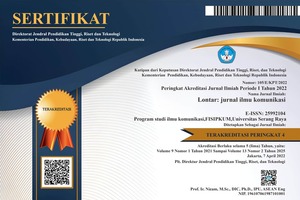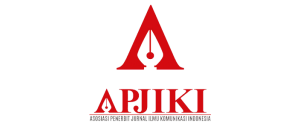Media Informasi Dan Komunikasi Pemerintah Provinsi Jawa Barat
DOI:
https://doi.org/10.30656/lontar.v7i1.1568Keywords:
Media, information, communication, virtual etnographyAbstract
The development of information technology in Indonesia grow rapidly, manyinstitution using digital media to communicate with the public. Internet users in Indonesia on
2017 is 143.26 million. This is in line with the increase of the number of users of social
media.To reach a large public, Governments need to use digital media to deliver information
and communicating with the public.
The purpose of the research is to describes the information and communication
media used by the provincial Government of West Java to communicate with the public and
what kind of information which delivered through official media of government. This study
uses qualitative methods, with the virtual Ethnography approach by analyzing the
information on social media and user interaction in the cyber space. Data collection process
is using observation of participation.
The results of the study show that the provincial Government of West Java using
official website, social media platform as instagram, facebook, twitter, youtube, and email to
communicate with public. The type of information which delivered by official media
provincial government of west java are the policy and Government program, tourism
information, tax, natural disasters, health, sports, the achievements of the Government,
activities, and the special event. Information which delivered through official website are
more formal and presented comprehensive. Nevertheless, information delivered through all
social media platform is the same information, in a different format
References
APJII. (2018). Pengguna internet di
Indonesia.
Barat, B. P. S. J. (2017). Peta Jawa Barat.
Liputan 6. (n.d.). Negara dengan jumlah
pengguna media sosial terbanyak.
Mulyana, D. (2003). Pengantar Ilmu
Komunikasi. Bandung: PT Remaja
Rosdakarya.
Mulyana, D., & Solatun. (2007). Metode
Penelitian Komunikasi. Bandung:
PT. Remaja Rosdakarya.
Nasrullah, R. (2014). Teori dan Riset
Media Siber. Jakarta: Kencana
Prenadamedia Group.
Nasrullah, R. (2017). Media Sosial (Vol.
IX). Bandung: Simbiosa Rekatama
Media.
We are social, H. (2018). “Essential
Insight Into Internet, Social Media,
Mobile, and Ecommerce Use Around
the World.†Retrieved from
https://inet.detik.com/cyberlife/d-
/130-juta-orang-indonesiatercatat-aktif-di-medsos.
Downloads
Published
Issue
Section
License
By submitting an article to the journal, the author(s) agree to transfer the published article's copyright to the journal, which will act as the publisher. This means the journal will have the right to publish the article in various forms, including reprints. The journal will maintain the publishing rights to the published articles.
In line with the license, authors and third parties (readers, researchers, and others) are allowed to share and adapt the material. In addition, the material must be given appropriate credit, provided with a link to the license, and indicated if changes were made. If authors remix, transform, or build upon the material, authors must distribute their contributions under the same license as the original.






